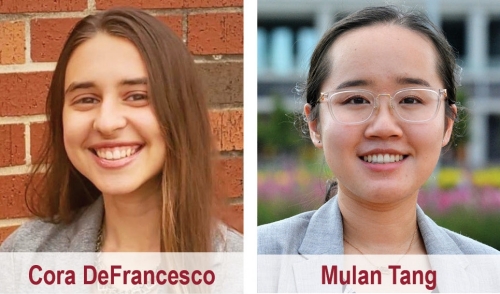
Applications for the 2023 Astronaut Scholar Class are now being accepted. Students currently enrolled at OU should see a faculty member on how to apply. Learn more.
In fall 2022, the Astronaut Scholarship Foundation recognized University of Oklahoma students Cora DeFrancesco and Mulan Tang, who were among 68 undergraduate students selected as Astronaut Scholars.
The students were honored at the Inventors Gala in Orlando, Florida. The Astronaut scholarship is offered to junior- or senior-year college students pursuing a degree in science, technology, engineering and math (STEM).
*****
Cora DeFrancesco, of New Bloomfield, Pennsylvania, is a graduate student at the OU School of Electrical and Computer Engineering. In December 2022, she earned dual bachelor’s degrees in astrophysics and mathematics from OU. Her research is in active galactic nuclei, which are the central supermassive black hole of galaxies actively accreting matter with the energy generated outshining all the stars in the galaxy. She studies a type of active galactic nuclei called quasars.
DeFrancesco has received support from the Research Experiences for Undergraduates (REU) program through the National Science Foundation allowing her to work with scientists at the University of Washington, Bothell. Her work is currently being considered for publication in the Astrophysical Journal, the top journal for professional astronomers. Xinyu Dai, Ph.D., associate professor, OU Dodge Department of Physics and Astronomy, recommended DeFrancesco for the astronaut’s scholarship.
*****
Mulan Tang, of Moore, Oklahoma, is a senior in the OU Stephenson School of Biomedical Engineering with an anticipated graduation date of May 2023. Her research focuses on regenerative therapies that when applied in an operating room may increase the quality of life of patients with neurological or cardiovascular diseases.
As a participant in an NSF-REU summer research experience, Tang worked with the electrospinning research group at Rowan University where the objective was to pattern peptide gradients onto the surface of polymer nanofibers. She has published in the Journal of Visualized Experiments and in Experimental Physiology. John Clegg, Ph.D., an assistant professor at the Stephenson School of Biomedical Engineering, served as a scholarship reference.
*****
Created in 1984, ASF awarded its first seven scholarships in honor of its founding members, the Mercury 7 Astronauts — Scott Carpenter, Gordon Cooper, John Glenn, Virgil “Gus” Grissom, Walter Schirra, Alan Shepard and Deke Slayton. Each founding member sponsored a $1,000 scholarship and began fundraising to support future scholarships by donating proceeds from their speaking engagements. The incredible efforts of these legends have shaped ASF’s mission to support and reward exceptional college students pursuing degrees in STEM. Over the past 38 years, more than $7 million has been awarded to more than 700 college students.
About Astronaut Scholarship Foundation
The Astronaut Scholarship Foundation (ASF) is an Orlando-based, 501(c)3 nonprofit commemorating the legacy of America’s pioneering astronauts. Founded by the six surviving Mercury 7 Astronauts in 1984, ASF partners with industry leaders, universities, and individual donors to achieve its mission of supporting and rewarding exceptional college students pursuing degrees in science, technology, engineering, and mathematics (STEM). In accordance with federal law and U.S. Department of the Treasury policy, this institution is prohibited from discriminating based on race, color, national origin, sex, age, or disability.
By Lorene A. Roberson, OU Gallogly College of Engineering